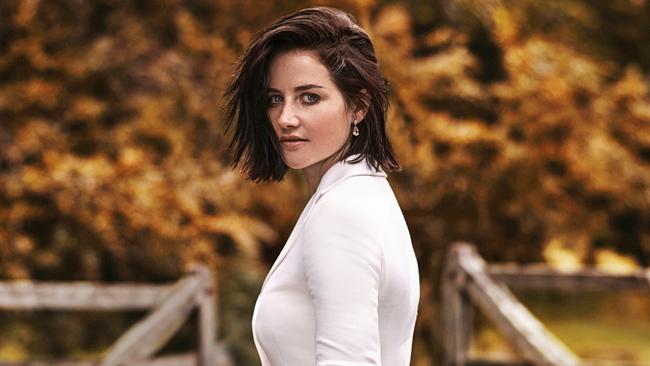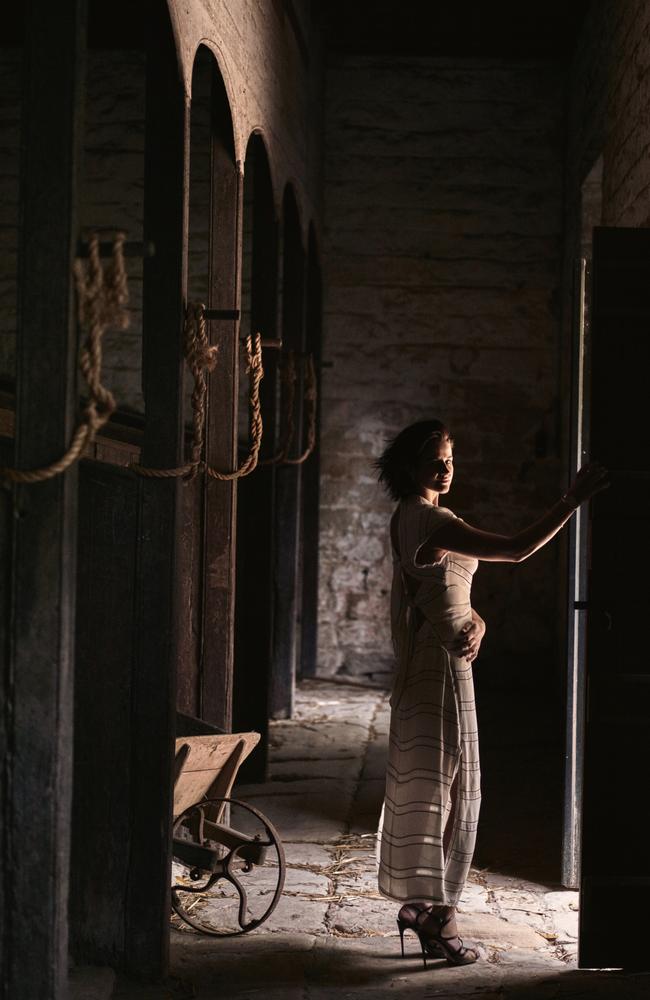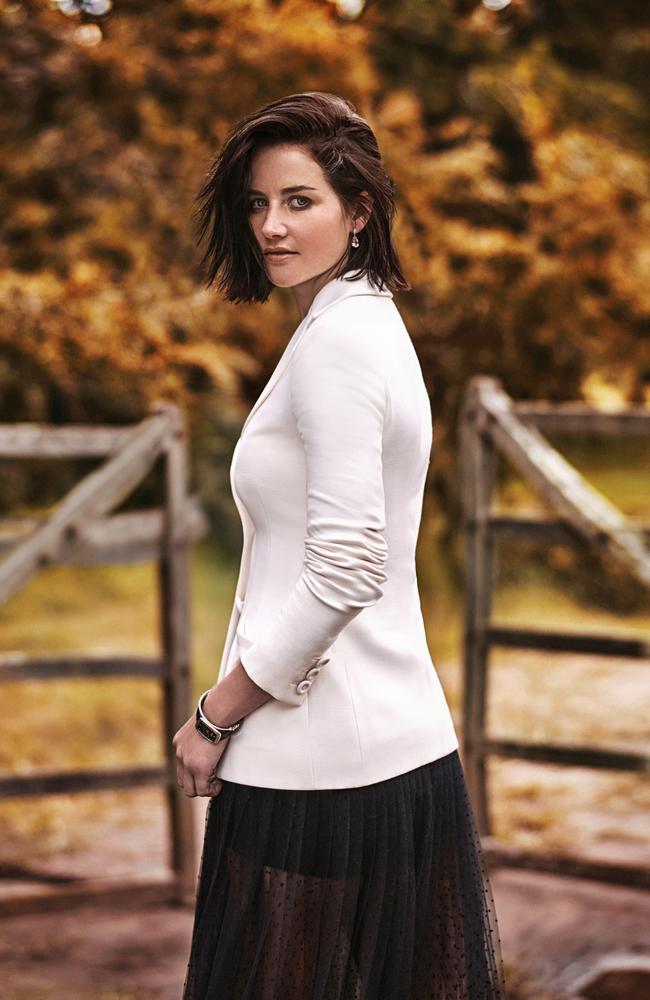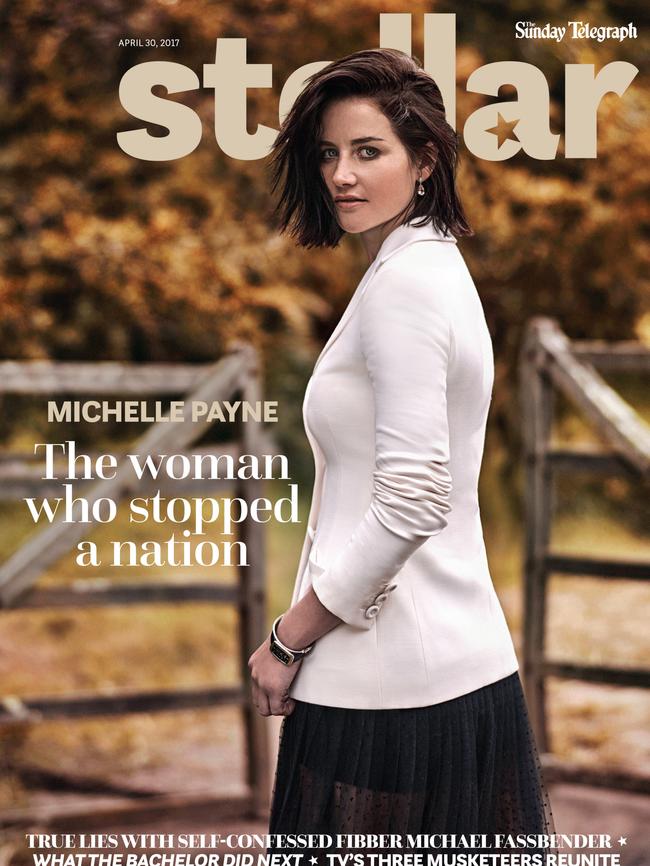Michelle Payne: ‘If something goes wrong, they blame the female jockey’
DESPITE her famous Melbourne Cup win, Michelle Payne still believes that the Australian racing industry treats female jockeys with suspicion.

Stellar
Don't miss out on the headlines from Stellar. Followed categories will be added to My News.
IT’S a common misconception that Michelle Payne first won the Melbourne Cup in 2015. In fact she had actually won it many times before — but on those occasions, she was the horse.
As children, her older brothers used to ride Payne and her closest sibling, Stevie, in mock horse races. Payne was Let’s Elope, and with Shane Dye — aka her brother Andrew — perched on her back, she would do laps of the lounge room on all fours.
Stevie would go hard and win the shorter-course events, but Payne was a stayer and regularly took out the Cup.

As the youngest of 10, she was brought up by her trainer dad, Paddy, to look after horses and ride. It was a world of frosty mornings, smelly stables and muddy floors. The family was part protective tribe, part Lord Of The Flies.
“A journalist once said our house was like a scene from Beirut,” Bernadette, one of Payne’s six older sisters, says. “It was fun — we would fight, and within five minutes we’d be back playing games.”
Payne’s Cup win in 2015 has catapulted her into a very different world, in which she poses for lavish magazine shoots and wears designer dresses to the members’ stand at Royal Randwick. Acclaimed actor Rachel Griffiths is making a film about her life. And next month, Payne will go to Washington, where she will receive a prestigious Longines equestrian award that has previously been bestowed upon Princess Anne, Bo Derek and Athina Onassis de Miranda.
The glamour, however, will not seduce Michelle Payne. Nothing could take her away from her horses.
“When you look at the list of injuries she has had, we can see she’s extremely resilient.”
Whenever 31-year-old Payne feels a quiver of fear before a race, she says a prayer to her mother, Rosa Mary, who died in a car accident when Payne was just six months old, and the fear fades. “I have a lot of faith that God will look after me, and Mum is up there looking over me,” she tells Stellar.
Payne’s attitude to the dangers of her sport is brave, given she has every reason to worry. Her eldest sister, Brigid, died in 2007 from a seizure that doctors believe was linked to a fall from a horse. Payne herself has broken 15 vertebrae, fractured her skull and had bleeding on the brain.
Her fall last May was the worst of her career; 500-kilogram horse Dutch Courage stepped on her at pace, lacerating her stomach and liver and splitting her pancreas. “When you look at the list of injuries she has had, we can see she’s extremely resilient,” Bernadette says. “As soon as she recovered, she would get straight back into racing.”

After her May accident, Payne intended to get back on the horse after her recovery, in this case her Cup-winning mount Prince of Penzance, and attempt to re-create the magic of the 2015 Melbourne Cup, when they rode to a victory that stopped a nation for an altogether different reason, and when, to the joy of women across the country, she told her doubters to “get stuffed”.
Not everyone, however, has as much belief in Payne’s powers of recovery as she does. The horse’s owners were worried Payne wouldn’t recover in time, and chose a different jockey for the Memsie Stakes at Caulfield in August.
“We know she’s had negative medical opinion and she seems determined to ride on, however we think she should retire,” managing owner John Richards said at the time. “She’s had medical advice not to ride again, which she’s chosen to ignore … We wish she would rest on her laurels. There’s nothing more for her to gain by riding on.” Payne disputes this, saying the doctors gave her the all clear to ride after six weeks.
When she found out she wouldn’t be riding Prince, she reacted on Twitter with a post that she quickly deleted. “Not anymore, I’m done,” she wrote. “Why work your arse off for people who don’t appreciate what you do and write you off anyway #moretolife.”
“I know the importance of every race and the significance of getting to the grand final is all the steps along the way.”
Payne tells Stellar the tweet was born of frustration. Of course she understood there was big money at stake, that the owners were unsure if she would be fit enough, and that they were worried about her health. Prince’s trainer, Darren Weir, also thought she should retire.
But Payne was not ready to give up racing.
“I was working really hard,” she says. “Obviously they didn’t owe me anything, but I felt it would have been the loyalty of having won the Cup to let me have a go at it. The way I like to look at it is we won the Melbourne Cup. Take away the negativity — it’s done now, that’s life.”
Prince put in an average showing at the Stakes, and again in the Makybe Diva Stakes a few weeks later. She rode against him in the Herbert Power Stakes in October, and during that race Prince fractured a foreleg. A couple of months before the Cup, he was retired.
Payne thinks Prince’s fate might have been different if she had been allowed to ride him in those races. “I know the importance of every race and the significance of getting to the grand final is all the steps along the way,” she says.

“Some of those races they were trying to win, and he couldn’t win those races. In the end, whether that was the reason it resulted in him finishing, who knows? I would have taken another approach.”
Payne visited Prince in hospital. She was hoping he might end up on her farm, but he will remain with Weir. “I’m sure I can go and say hello to him,” she says.
Over the next year or two, Payne will wind up her racing career and become a full-time trainer. Late last year, Victoria changed its rules to allow jockeys to ride and train simultaneously, and Payne was the first to win a race on a horse she had trained herself.
She admits it can be difficult as a trainer and jockey to balance a passion for horses with the business of racing. “You have to remind yourself that you’re trying to win races. But at the same time you can love and respect their personalities. Yes, they’re racehorses, but if something happened I’d be devastated. They’re like your children.”
Payne isn’t sure when her last race as a jockey will be, but she knows one thing: she will be the one making that decision. “I’ve had a lot of bad injuries and my family would be happy to see me stop,” she says. “But I think that will be the time when I feel I’ll be ready to move onto something else.”
“From a really early age she just had a natural affinity with racehorses.”
There are five women who Payne looks up to in racing — her sisters.
“They paved the way,” she says. “They put up with a lot more crap than I did, but they just brushed it off. It was different for them; there were hardly any girls.”
Of the seven girls and three boys in the family, all but two — Stevie, who has Down syndrome, and Margaret — became jockeys.
“Margaret was smart enough to realise it was too dangerous and to go to university instead,” Bernadette says. “I stopped about six years ago, mainly due to injuries. I had a lot of injuries.”
Bernadette agrees that life as a jockey was tougher for the older Payne girls, because in her day male strength was considered the superior ability, despite a growing understanding that women’s affinity with the horses was just as valuable. But still, she says, none of the Payne girls were as talented as Michelle.
“I never had the same ability as Michelle to make it to the top level,” she admits. “From a really early age she just had a natural affinity with racehorses. Horses were nicer to her. Sometimes they would change riders, and the horses would always go better for her.”

Of the Payne women, Michelle was the only one to voice her determination to win the Cup. “She was as smart as most adults when she was young,” Bernadette adds. “She was determined.”
Payne believes that a lack of faith in female jockeys persists, despite her Cup win. “Most trainers and owners, if they have a choice to put on a jockey, they will put on a male,” she says. “If something goes wrong, they’ll blame the fact that they put a female jockey on, even though it probably would have happened with a male jockey. That’s just the mentality of how they think in racing in Australia.”
She agrees her success has made her a positive role model for girls aspiring to a career in racing. “I try to portray to the younger girls to take it very seriously,” she says. “To me, that feels like the most special thing … to be a great role model to the girls coming through.”
Even so, she doesn’t think of her win as being a watershed for women. “I was just doing my best,” she says.
But others see it differently.
Rachel Griffiths was inspired to bring Payne’s story to the screen by the jockey’s drive and resilience. “It’s difficult to put into words the collective joy her win gave us,” she tells Stellar. “The cheering was universal — fathers, mothers and daughters. Both within the industry and for those, like me, who knew nothing about the sport, we understood both the symbolic and very concrete achievements her win represented.

“It’s hard to name another sport where men and women compete with equal standing. I think young women will find the stories behind Payne’s win enormously encouraging.”
Next month, Payne will travel to Washington DC to collect the Longines Ladies Award, which celebrates women who achieve at the highest level in the equestrian world and has previously honoured the likes of the Princess Royal and Onassis.
She will take the stage on May 19 alongside three others, including showjumper Georgina Bloomberg, the daughter of former New York mayor Mike Bloomberg. Payne will be the first jockey and first Australian to win one, and she will accept the award wearing a specially designed couture gown. (“It’s nice to have that femininity,” she says of embracing elegance for the evening.)
But she’ll only be away for a week, because there are horses to be fed and races to be planned. Michelle Payne’s future isn’t in fancy ballrooms. It is in muddy paddocks, hopefully with a few kids — four, she says, rather than 10 — to whom she can pass on the family trade. “I’m a country girl at heart,” she says.
Photography: Jake Terrey
Styling: Brad Homes
Creative Direction: Aleksandra Beare
Hair: Keiren Street
Make-up: Charlie Kielty
Originally published as Michelle Payne: ‘If something goes wrong, they blame the female jockey’


